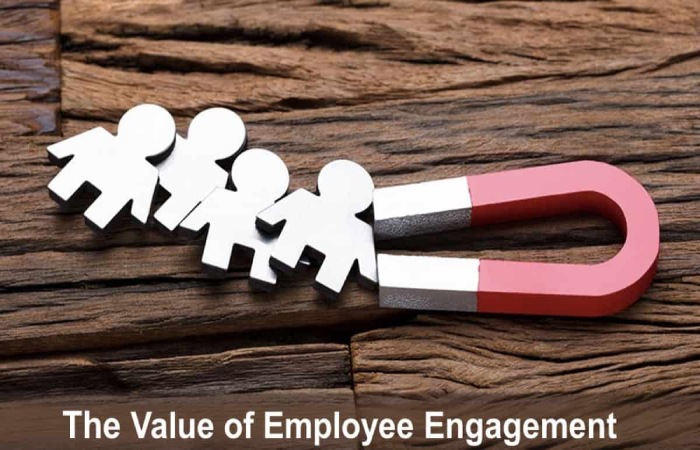Employee Engagement Write for us.

Employee engagement is employees’ involvement and interest in their work and workplace. You can find out if your employees are actively affianced with their work or simply putting in their time. You can discover if your team-building activities and human resources practices influence positive business results or if there’s room to grow. And with the correct method, you can learn how to improve your employees’ joining to their work and your company.
What Is Employee Engagement?
Employee engagement is a human resources concept that describes workers’ enthusiasm and dedication toward their job. Engaged employees care about their work and the company’s performance and feel that their efforts make a difference. An active employee is in it for more than a paycheck and may consider their well-being linked to their performance, thus active to their company’s success.
Understanding Employee Engagement
Employee engagement can be critical to a company’s success, given its links to job satisfaction and employee morale. Communication is a vital part of creating and maintaining employee engagement. Engaged employees are more likely to be original and higher performing. They also often commit more to a company’s values and goals.
Employers can encourage operative engagement in many ways, including interactive expectations, offering rewards and promotions for excellent work, informing workers about the company’s actions, and even providing feedback.
Other strategies include making laborers make employees feel valued and appreciated and that their ideas are being heard and understood. Engaged employees believe that their work is expressive, that they are appreciated and backed by their supervisors, and that they entrust with the success of their company.
Importance of Employee Engagement
In a society where being a career “lifer” is increasingly less common, engaging your employees from the start is critical to retaining the top talent you worked hard to attract.
Because no matter how good of a work ethic and overall fit a person is to your company, their engagement levels will decrease significantly if you don’t have a plan to support their interests and needs throughout their career. Only 36 percent of U.S. employees are classified as engaged at work, a significant issue for employers. Still, executives and leadership teams often wonder why employee engagement is essential. The following outcomes prove its positive impact on your business:
Engaged Employees Are More Productive
According to a meta-analysis by Gallup, companies with higher employee engagement saw a 21 percent increase in productivity. The reason? Engaged employees “bought into what the group is about and also are trying to make a difference,” Gallup’s chief employee engagement and well-being scientist, Jim Harter, said in the report. “This is why they’re usually the most productive workers.”
Engaged Employees Lead to Higher Profits
Not only can prioritizing employee engagement save you money, but it can also be more lucrative. Invest in your employees, and you’ll see it pay off in dividends. On the flip side, disengaged employees cost companies money. Employee disengagement costs the U.S. economy between $483 to $605 billion annually in lost output. When it comes down to dollars and cents, engaged employees are more valuable.
What Employee Engagement is not
Employee engagement is often confused and interchangeable with happiness, satisfaction, or well-being. But some apparent differences among these concepts are essential to understand.
Employee happiness
Some leaders may wonder how to keep employees happy. While important, happiness is not the same as engagement. It says nothing about how invested employees are in the company, nor how hard they’re working on behalf of the organization’s mission. Happiness is a short-term, rapidly changing measurement. For example, an employee may feel temporary happiness from a raise and then sink back into disengagement.
Employee satisfaction
Employees can only measure at the surface level. A satisfied employee may not engage. Generally speaking, happy employees will not take steps to go above and beyond. They usually stick around but aren’t driven to go the extra mile. Engaged employees are productive, while satisfied employees tend to coast through their work and experience.
Employee well-being
Employee well-being evaluates many areas of an employee’s life, such as how well they cope with stress or if they’re fulfilling their potential. Providing resources to increase employee well-being can increase employee engagement. Employee engagement focuses on an employee’s connection with their company, not their own well-being.
How to Submit Your Articles
To Write for Us, you can correspondence at To Submitting Your Articles for my sites is
Why Write for Techies Times – Employee Engagement Write for Us

Search Terms Related to Employee Engagement Write for Us
certificate in management accounting
Guidelines for Article to Writing Employee Engagement Write for Us

You can send your email to contact@techiestimes.com
Search Terms Related for Employee Engagement Write for Us
- Employee engagement
- Employee satisfaction
- Employee motivation
- Employee retention
- Employee productivity
- Workplace culture
- Leadership
- Communication
- Training and development
- Benefits
- Work-life balance

